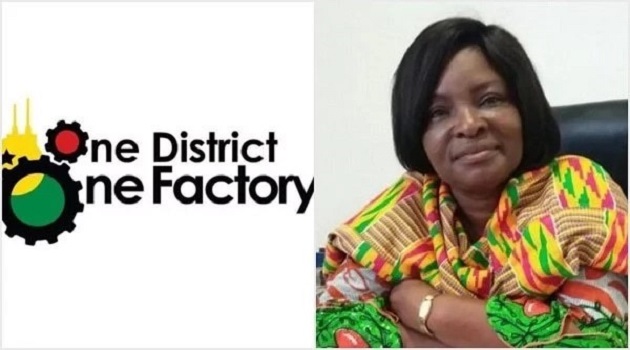Gifty Ohene Konadu
The ‘One District, One Factory’ (1D1F) Secretariat is gearing up to commission 69 more factories in the course of the year.
This forms part of proposals sent to the various banks for support to complement the efforts of the government in delivering its promise of a factory each in the 273 districts across the length and breadth of the country.
The breakdown of the distribution is as follows: Greater Accra Region – 11, Brong-Ahafo – 5, Ashanti – 12, Central – 5, Western – 6, Volta – 3, Eastern – 12, Northern – 12, Upper East – 2 and Upper West – 1.
National Coordinator of the ‘One District, One Factory’ programme, Gifty Ohene Konadu, who made the disclosure, indicated that the secretariat had forwarded 60 business plans and proposals to some participating financial institutions to study; 28 of such proposals have been submitted to GCB Bank and the remaining 41 to Ghana EXIM Bank.
The business plans, she added, were submitted between October 6 and 21 December, 2017. Ten additional projects have also been submitted to the African Development Bank (AfDB) for infrastructural support.
According to Madam Ohene Konadu, four of the business proposals had been processed by the banks and credit reports written on them for onward submission to the Risk Department and Board for final approval.
Four of the business proposals are still in the processing stage, with the promoters of these businesses expected to provide further documents to the financial institutions.
The banks, she further disclosed, had also made initial contacts with 42 promoters and are waiting for them (promoters) to provide the necessary documentation in order for their applications to be processed.
The proposals thus far cover five broad sectors namely, agro-processing – livestock (10), agro-processing – crop (27), hospitality/fashion (15), manufacturing (other than agro products) (16) and health (1).
In the interim, three agro-processing projects are ready to be rolled out soon.
This follows their successful passage through evaluation at the secretariat and subsequent approval by the banks that are ready with the funding mechanism.
The projects are Amantin Agro-Processing Project, Asikess Ventures Limited and Kpetsu, Adaklu Agro-Processing Project.
All three projects would wholly rely on cassava for production.
Amantin Project
The Amantin Agro-Processing Project, which would be located at Atebubu Amantin in the Brong-Ahafo Region, has a processing plant capacity of 1,200 tonnes per day and is expected to produce seven tonnes of industrial starch every 24 hours.
Ms Gifty Ohene Konadu, who made the disclosures, said pre-fabricated materials for the construction of the factory had been shipped to Ghana with part of the shipment having “already arrived at project site.”
The factory, she added, has six dams to ensure all-year-round cultivation.
The facility would be supported by 8,000 acres of cassava nucleus farms, with additional 8,000 acres to be added in the coming months.
The coordinator stressed that funding for the project is “firmly secured” and that the first phase of it (project) is estimated to create 3,000 direct employments.
Asikess Ventures Plant
This agro-processing plant is expected to be established on a 9,000 hectare land at Begoro Aburaso in the Eastern Region.
The 1D1F secretariat said the plant would have a production capacity of 100 metric tonnes per day.
Out-growers with two acres holding per unit are expected to be organized to produce the raw materials to feed the factory.
According to Madam Ohene Konadu, seedlings, land clearing devices and weedicides would be supplied to the out-growers to fast-track their work.
Kpetsu, Adaklu Agro Processing Project
The Kpetsu, Adaklu processing plant would be located on a 16,000 acre land at Kpetsu in the Volta Region.
Even before the factory takes off, 1,500 acres out of the 16,000 acres of the acquired land had been cleared, with 650 acres of cassava of various species cultivated.
Madam Ohene Konadu, speaking on the facility, said that an additional 50 acres of land had been acquired to house factory buildings and offices. Out-growers schemes would soon be organised to support the project.
By Charles Takyi-Boadu


